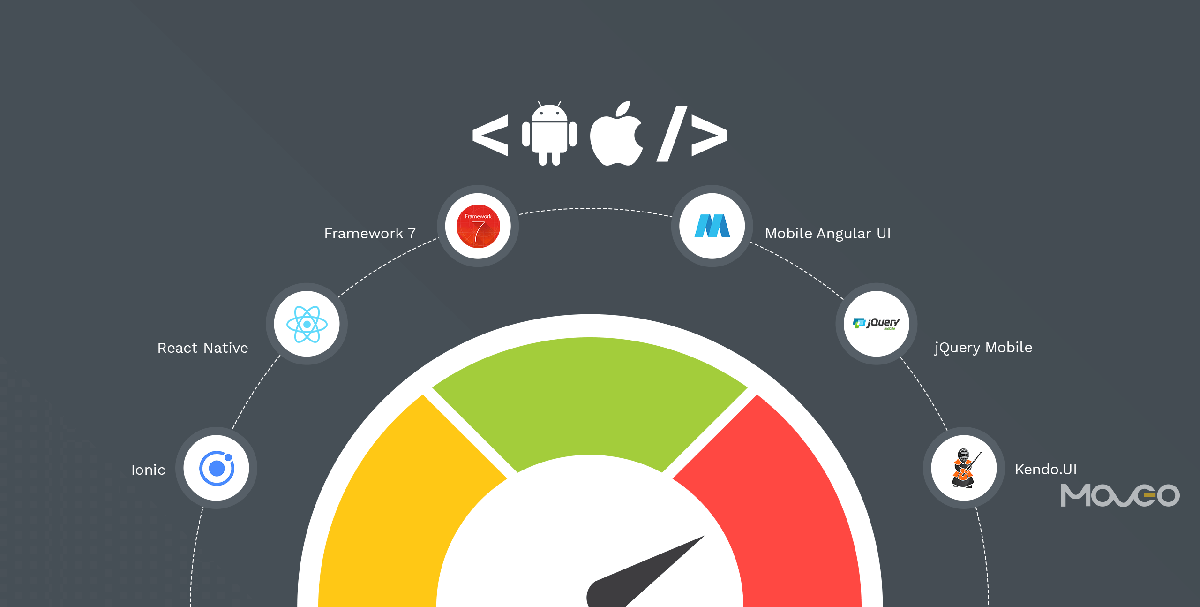While the jury is still out on which is the better way to build apps – native or hybrid, there is simply no resisting the charm of getting an elegantly functional, native quality app that can be developed once and used on both Android and iOS. And even though nothing beats the exquisite feel of a native app, modern hybrid apps have come a long way in providing you an immaculate performance, while saving you time and money. So unless you need a super extra high-performance app with specs like 60fps, 3D rendering, and holographic VR, you can bet on hybrid apps to fire up your business and keep users engaged.
Among other technologies, modern and powerful hybrid app development frameworks have a big role to play in the ascension of hybrid apps to near-native standards. So if you are planning to dabble in the world of hybrid apps, here’s an overview of the 7 best hybrid app development frameworks.
1. Ionic
Some would say Ionic is the best framework for building high-quality hybrid apps, and we wouldn’t want to disagree, even though each framework has its own strengths. The fact that Ionic is free and open source lowers the barriers to entry allowing developers everywhere to get a headstart. Moreover, Ionic’s default UI template and its JavaScript and CSS components make it super easy for beginners to get their feet wet. The default templates are simple, sleek and self-sufficient, while also providing plenty of customization options. Since it is built on top of AngularJS, it makes mobile app development with Angular even easier. Those who know Angular can learn Ionic in no time and go on to build web as well as mobile apps. With the help from ngCordova, Ionic makes integrating native functionalities all the more powerful and simple. Another very advantageous aspect of using Ionic is that it has an active community with many of the founders easily reachable over social media or the Ionic Stack channel.
2. React Native
Developed and maintained by the engineers at Facebook and Instagram, React Native is definitively one of the newest age frameworks that let you develop hybrid apps with native quality performance. It can be used to create apps that work flawlessly on Android and iOS, with a shared JavaScript code. When you use React Native, your API calls and state management reside in JavaScript and the UI elements are rendered as native views. This way, your UI follows platform specific style guides and yet, you can reuse and share up to 85% to 99% of the code, as Instagram says that it did.
Instead of running in WebView, React Native apps run natively, which is a large improvement over earlier hybrid apps. A platform-specific interface can be applied, so the app uses native APIs and callouts, giving the app a much more authentic native appeal. This polished utility of native apps mixed with the cost-effective development and reusability of hybrid apps is one of the big reasons why React Native is the hybrid app framework of the future.
3. Framework 7
Just like the last two items on this list, developers who swear by Framework 7 aren’t in short supply either. For the lack of a steep learning curve, any developer familiar with CSS, HTML and JavaScript can easily learn Framework 7 and begin creating beautiful apps. Despite having no external dependencies like React or Angular, Framework 7 delivers attractive animations and well-styled components that bestow native like authenticity to the app experience. Adding to this native feel are features like swipe back, native scrolling and other nifty capabilities. An arsenal of ready to use UI elements like models, side panels and more add an element of zing, making developing with Framework 7 an enjoyable experience.
4. Mobile Angular UI
Another popular choice, Mobile Angular UI is quite similar to Sencha Touch. Originally an HTML framework, Mobile Angular UI can be used as an extension to Bootstrap 3. However, it doesn’t have any dependency on Bootstrap 3 or even jQuery for that matter. So all you need is Angular JS directives and you can get cracking on your latest hybrid app. Mobile Angular UI is now easily available on Github for free and can be used under an MIT license.
5. jQuery Mobile
If old really is gold, jQuery Mobile is indeed a precious framework for app developers. It doesn’t try to mimic Android or iOS apps. Instead, it lays focus on developing quality web apps that work flawlessly across all mobile web browsers including not just iOS and Android but also Windows and Blackberry. It is lightweight, relatively easy to learn and has ample support for PhoneGap/Cordova.
6. Kendo.UI
In addition to its open source framework, Kendo.UI also has an enterprise edition. It extends UI support for jQuery, Angular, React and several others. It lets you create responsive, data-rich apps, thanks to its powerful data-binding, ready-to-use themes, and cross-browser compatibility. The rich arsenal of UI components – all the way from DropDowns, buttons, and menus to Spreadsheets, Charts, Scheduler, and Maps – make Kendo.UI an absolute delight to develop with.
Wrapping Up
So those are 6 of our favorite hybrid app development frameworks that simplify, speed up and economize the process of app development without compromising the performance. While some niche businesses may still prefer to stick to native app development, you can develop stunning apps using one of these hybrid app frameworks, if you are in the market for a quicker, cost-effective solution.


